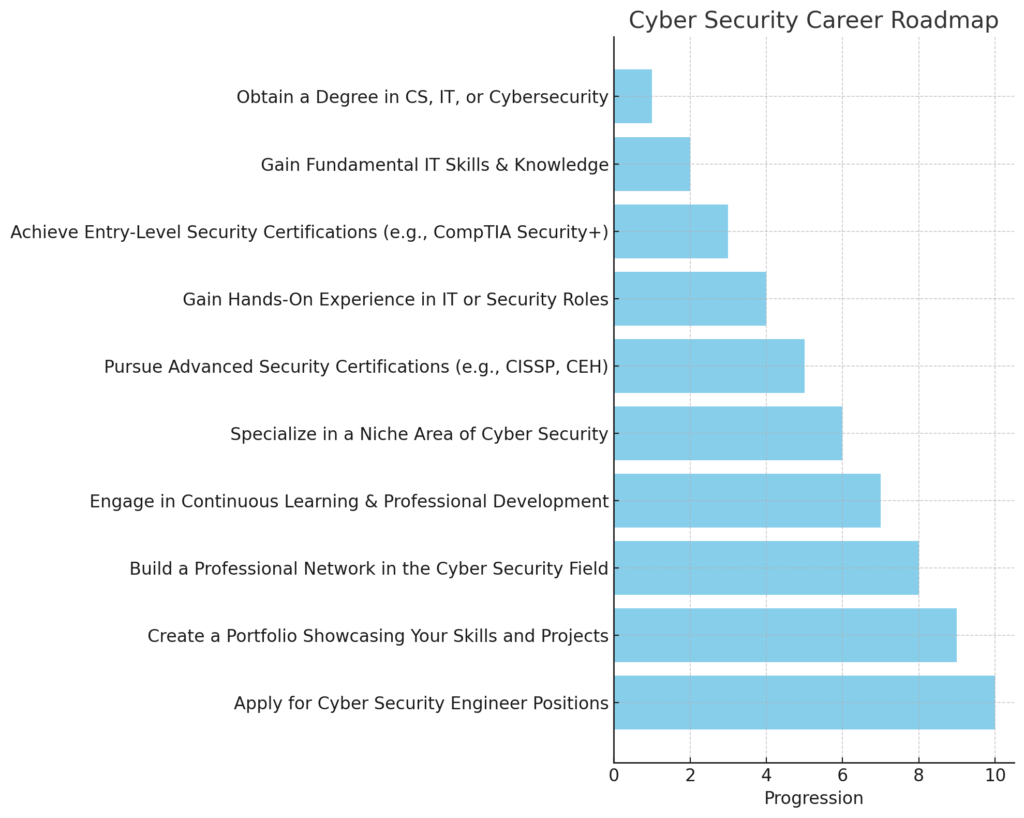In the digital age, where data breaches and cyber threats loom large, the role of a cyber security engineer has never been more critical. These guardians of the digital realm employ a blend of expertise, vigilance, and technological prowess to protect organizations’ computer systems, networks, and sensitive data from malicious attacks. As the complexity and volume of cyber threats continue to escalate, the demand for skilled cyber security professionals has surged, offering a promising and dynamic career path for those interested in safeguarding the digital frontier.
This guide aims to illuminate the career path to becoming a cyber security engineer, a journey characterized by continuous learning, adaptation, and specialization. Whether you’re a student contemplating a future in cyber security, an IT professional seeking to pivot into a more specialized role, or simply fascinated by the prospect of defending against cyber threats, this article provides a comprehensive roadmap. From the foundational steps of acquiring the right education and certifications to the nuances of gaining practical experience and navigating the landscape of cyber security specialties, we’ll explore the essential milestones and strategies to build a successful career in cyber security engineering.
Cyber security engineering is not just about technical acumen; it’s a multidisciplinary field that requires a keen understanding of the ever-evolving threat landscape, problem-solving skills, and the ability to communicate complex security concepts effectively. As we delve into the requirements, skills, and pathways that define this career, we’ll also highlight the importance of continuous professional development and the value of networking within the cyber security community.
Embarking on the path to becoming a cyber security engineer is both a challenging and rewarding endeavor. It’s a career that offers the opportunity to make a significant impact, protecting digital information and infrastructure against increasingly sophisticated cyber threats. Join us as we explore the steps, skills, and insights needed to navigate this exciting and crucial field, paving the way for a fulfilling and impactful career as a cyber security engineer.

Information Security Manager Career Path
Propel your career forward and be part of an essential member of any management team as an Information Security Manager. This advanced training series is designed specifically for those want to move up into a management position in the IT field.
How to Become a Cyber Security Engineer
Educational Foundation: A degree in computer science, information technology, or cybersecurity is often the first step. This provides a solid foundation in essential concepts and technical skills. An educational foundation in computer science, information technology, or cybersecurity serves as the cornerstone for aspiring cyber security engineers. This foundational step is crucial because it equips students with a broad understanding of the principles and practices that underpin the field of cyber security, along with the technical skills necessary to navigate its complexities.
Specialized Training and Certifications: Pursuing cyber security engineer training through certifications like CompTIA Security+, Certified Information Systems Security Professional (CISSP), or Certified Ethical Hacker (CEH) is crucial. These programs offer in-depth knowledge and practical skills in cybersecurity practices, tools, and technologies.
Degree Programs and Specializations
- Computer Science:
A degree in computer science provides a comprehensive overview of computing principles, software development, algorithms, and data structures. It lays the groundwork for understanding the technical aspects of cyber security, including coding for security software and analyzing algorithms for vulnerabilities. - Information Technology (IT):
An IT degree focuses on the application of technology solutions to solve business problems. Students learn about network infrastructure, database management, and IT project management, which are vital in understanding how to protect and secure organizational data. - Cybersecurity:
Specialized cybersecurity degree programs offer focused coursework on information assurance, network defense, ethical hacking, and digital forensics. These programs are designed to prepare students for the specific challenges and responsibilities of a cyber security engineer.
Gain Practical Experience: Hands-on experience is invaluable. Starting in entry-level IT or security roles, such as a security analyst, allows individuals to apply their knowledge in real-world settings. Internships and project work can also provide practical experience.
Continual Learning and Advancement: The field of cybersecurity is ever-evolving. Continuing education through advanced courses, workshops, and certifications is essential to stay ahead of new threats and technologies. While a degree provides a strong foundation, the field of cyber security is continually evolving. As such, certifications and ongoing education play a critical role in keeping up with new technologies, methodologies, and best practices. Certifications can also complement academic knowledge, offering practical skills and specialized expertise that are highly valued in the industry.
Cyber Security Roadmap
A cyber security roadmap outlines the strategic steps an aspiring engineer should follow, from foundational education to specialized training and beyond. It includes gaining experience in IT security roles, understanding the responsibilities of a cyber security engineer, and continuously updating skills to combat emerging threats.
The Steps to Take for a Cyber Security Career Roadmap

.

Cybersecurity Ethical Hacker
Ready to become an unstoppable force in cybersecurity? Our Certified Ethical Hacker V12 course is your gateway to mastering the art of ethical hacking. Dive deep into vulnerability analysis, target scanning, and stealthy network penetration. With hands-on activities and expert insights, you’ll learn to break into target networks, gather evidence, and exit without a trace. Don’t just learn to hack—learn to hack like a pro!
Certifications: Are an Integral Part of the Career Path to Becoming a Cyber Security Engineer
Certifications in the field of cyber security play a pivotal role in shaping a successful career as a cyber security engineer. They serve multiple essential functions in both the personal development of the cyber security professional and their recognition in the job market. Below are key reasons why certifications are considered crucial in the cyber security roadmap:
Validation of Skills and Knowledge
Certifications offer a standardized measure of a professional’s capabilities and understanding of specific cyber security concepts, tools, and practices. They provide an objective validation of one’s skills, ensuring employers that the individual possesses the competencies required to perform effectively in a cyber security role.
Bridging the Gap Between Education and Practical Application
While a degree provides the theoretical foundation, certifications are often more focused on the practical aspects of cyber security. They ensure that professionals not only understand the theory behind cyber security practices but can also apply this knowledge in real-world scenarios. This practical focus is invaluable in a field where the ability to respond to evolving threats and technologies is crucial.
Career Advancement
Certifications are a key factor in career development and advancement within the cyber security domain. They can significantly enhance an individual’s job prospects, potential for promotion, and salary expectations. By earning advanced certifications, professionals signal their commitment to continuous learning and their capability to take on more complex responsibilities.
Meeting Industry Standards
Many cyber security positions, especially those related to government and defense, require specific certifications to comply with industry standards and regulations. Certifications such as CISSP (Certified Information Systems Security Professional) are often mandatory for roles that involve the protection of sensitive information, ensuring that individuals are well-versed in security policies and procedures.
Keeping Pace with Evolving Technologies
The field of cyber security is dynamic, with new threats and technologies emerging at a rapid pace. Certifications require professionals to engage in continuous learning, often through recertification processes that ensure their skills and knowledge remain up-to-date. This continuous education is vital for staying effective in protecting against current and emerging cyber threats.
Professional Credibility and Recognition
Earning certifications can enhance a professional’s credibility both within their organization and in the broader cyber security community. Certifications from recognized institutions or organizations lend authority to a professional’s expertise, facilitating networking opportunities, collaborations, and peer recognition.
Specialization and Niche Expertise
Cyber security encompasses a broad range of specialties, from ethical hacking and forensics to compliance and risk management. Certifications allow professionals to specialize in niche areas of interest, enabling them to become experts in specific facets of cyber security and further differentiate themselves in the job market.
Certified Information Systems Security Professional
CISSP is the perfect credential for those with advanced technical and managerial skills, experience, and credibility to design, implement, and manage an information security program that can protect organizations from sophisticated attacks.
Roles Available in the Cyber Security Domain
| Position | Average Annual Salary (USD) |
|---|---|
| Cyber Security Analyst | $70,000 – $95,000 |
| Information Security Manager | $100,000 – $140,000 |
| Network Security Engineer | $85,000 – $115,000 |
| Cyber Security Engineer | $90,000 – $120,000 |
| Security Architect | $110,000 – $150,000 |
| Ethical Hacker | $80,000 – $130,000 |
| Chief Information Security Officer (CISO) | $150,000 – $200,000+ |
| IT Security Consultant | $90,000 – $130,000 |
Conclusion
In conclusion, the journey to becoming a cyber security engineer encompasses a multifaceted blend of education, certifications, practical experience, and continuous professional development. This career path is not only challenging and demanding but also immensely rewarding, given the critical role cyber security professionals play in safeguarding digital information and infrastructure in our increasingly interconnected world.
The educational foundation in fields such as computer science, information technology, or cybersecurity lays the groundwork for understanding the complexities of cyber threats and the methodologies for combating them. Certifications further augment this knowledge base, offering a practical, hands-on approach to the latest tools, technologies, and best practices in the field. They serve as a testament to an individual’s expertise and commitment to staying at the forefront of cyber security advancements.
Practical experience, gained through internships, entry-level positions, and continuous learning opportunities, is invaluable. It allows aspiring cyber security engineers to apply their knowledge in real-world scenarios, honing their skills in identifying, mitigating, and responding to cyber threats. Specializing in niche areas within cyber security not only enhances one’s skill set but also opens up opportunities for advancement in specific sectors of interest.
Moreover, the importance of networking and engaging with the cyber security community cannot be overstated. It fosters professional growth, mentorship opportunities, and keeps individuals informed about the latest trends and threats in the industry.
The employment landscape for cyber security professionals is robust and diverse, with competitive salaries reflecting the high demand for skilled individuals capable of protecting organizations against evolving cyber threats. From cyber security analysts to Chief Information Security Officers, the range of roles available offers numerous pathways for career advancement and specialization.
Ultimately, a career as a cyber security engineer is a commitment to lifelong learning and adaptation in the face of new challenges. It offers the chance to make a significant impact, protecting not just digital assets but also the privacy and security of individuals and communities worldwide. For those passionate about technology and driven by the mission to defend against cyber threats, the path to becoming a cyber security engineer is a fulfilling and impactful journey.

Lock In Our Lowest Price Ever For Only $14.99 Monthly Access
Your career in information technology last for years. Technology changes rapidly. An ITU Online IT Training subscription offers you flexible and affordable IT training. With our IT training at your fingertips, your career opportunities are never ending as you grow your skills.
Plus, start today and get 10 free days with no obligation.
Cyber Security Engineer Career FAQs
What degree is best for a career as a cyber security engineer?
A degree in computer science, information technology, or cybersecurity is highly recommended for those looking to pursue a career as a cyber security engineer. These degrees provide a solid foundation in essential concepts and technical skills crucial for understanding and mitigating cyber threats.
Are certifications necessary to become a cyber security engineer?
Yes, certifications play a significant role in the cyber security field. They validate your skills and knowledge, keeping you updated with the latest security practices and technologies. Certifications such as CompTIA Security+, CISSP, and CEH are particularly valuable for aspiring cyber security engineers.
How can I gain practical experience in cyber security?
Practical experience can be gained through internships, entry-level IT or security roles, and participating in cyber security competitions and projects. Hands-on experience is crucial for understanding real-world applications of cyber security principles and technologies.
What skills are essential for a cyber security engineer?
Cyber security engineers need a blend of technical and soft skills. Technical skills include knowledge of network security, encryption, threat detection, and familiarity with various operating systems and programming languages. Soft skills such as problem-solving, attention to detail, and effective communication are also vital.
What is the career outlook for cyber security engineers?
The career outlook for cyber security engineers is highly positive, with demand for skilled professionals expected to grow significantly in the coming years. The increasing prevalence of cyber threats and the need to secure digital infrastructure ensure that cyber security engineers will continue to be in high demand across various industries.

























